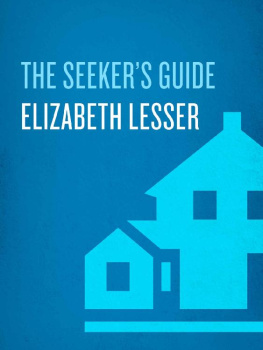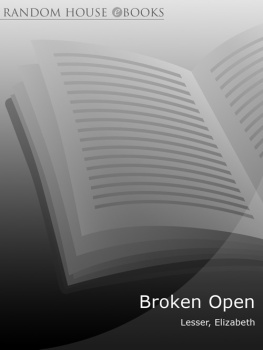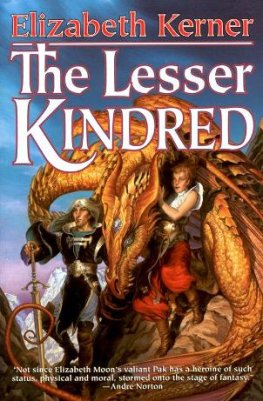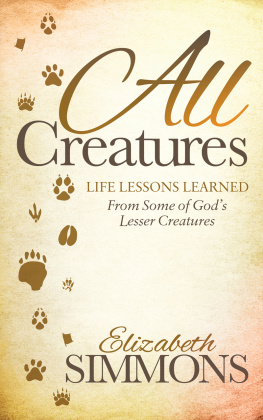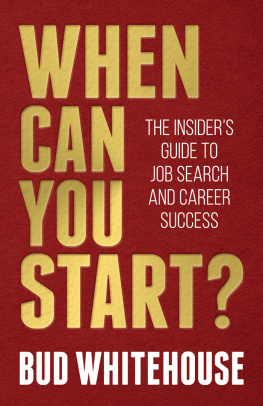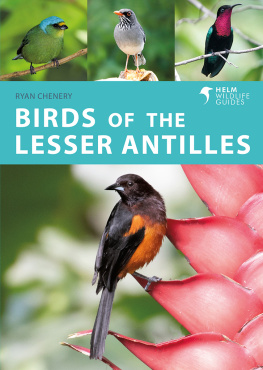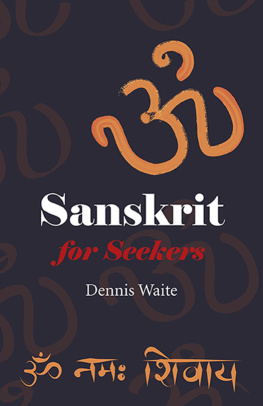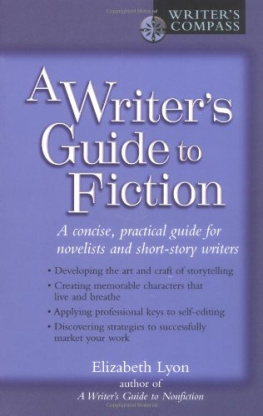Elizabeth Lesser - The Seekers Guide
Here you can read online Elizabeth Lesser - The Seekers Guide full text of the book (entire story) in english for free. Download pdf and epub, get meaning, cover and reviews about this ebook. year: 2008, publisher: Random House Publishing Group, genre: Religion. Description of the work, (preface) as well as reviews are available. Best literature library LitArk.com created for fans of good reading and offers a wide selection of genres:
Romance novel
Science fiction
Adventure
Detective
Science
History
Home and family
Prose
Art
Politics
Computer
Non-fiction
Religion
Business
Children
Humor
Choose a favorite category and find really read worthwhile books. Enjoy immersion in the world of imagination, feel the emotions of the characters or learn something new for yourself, make an fascinating discovery.
- Book:The Seekers Guide
- Author:
- Publisher:Random House Publishing Group
- Genre:
- Year:2008
- Rating:3 / 5
- Favourites:Add to favourites
- Your mark:
- 60
- 1
- 2
- 3
- 4
- 5
The Seekers Guide: summary, description and annotation
We offer to read an annotation, description, summary or preface (depends on what the author of the book "The Seekers Guide" wrote himself). If you haven't found the necessary information about the book — write in the comments, we will try to find it.
The Seekers Guide — read online for free the complete book (whole text) full work
Below is the text of the book, divided by pages. System saving the place of the last page read, allows you to conveniently read the book "The Seekers Guide" online for free, without having to search again every time where you left off. Put a bookmark, and you can go to the page where you finished reading at any time.
Font size:
Interval:
Bookmark:

Copyright 1999 by Elizabeth Lesser
All rights reserved under International and Pan-American Copyright Conventions. Published in the United States by Villard Books, a division of Random House, Inc., New York, and simultaneously in Canada by Random House of Canada Limited, Toronto.
VILLARD BOOKS and colophon are registered trademarks of Random House, Inc.
This book was originally published in 1999 by Random House, a division of Random House, Inc., in slightly different form, as The New American Spirituality.
Owing to limitations of space, acknowledgments of permission to quote from previously published materials will be found following the backmatter.
Library of Congress Cataloging-in-Publication Data
Lesser, Elizabeth.
The seekers guide: making your life a spiritual adventure / Elizabeth Lesser.
p. cm.
Includes bibliographical references.
Spiritual life. I. Title.
BL624.L46 1999 291.4dc21 98-50310
Villard Books website address:
www.villard.com
eISBN: 978-0-345-51658-9
v3.0_r2
Contents
Introduction
Although a book is born of many impulses, and influenced by diverse experiences, authors often speak of a symbolic moment of conceptionan aha moment when you say to yourself, I have to tell this story. That moment came for me several summers ago, in the faculty dining room at Omega Institute, the education and retreat center I cofounded in 1977. Over the years I have shared countless meals with conference and workshop leaders in that room, moderating discussions between medical doctors and shamanic healers, Christian monks and Jewish rabbis, Zen teachers and business executives.
On this particular day I was eating lunch with Babatunde Olatunji, the West African drum master and world-music innovator. Seated next to Baba was the American poet Allen Ginsberg, engaged in conversation with Gelek Rinpoche, a Tibetan Buddhist lama, and Joseph Shabalala, a South African musician and freedom fighter. They were talking about their twin passionspolitics and spiritualityand how challenging it was to combine the two. At the other end of the table was the onetime heavyweight champion of the world Floyd Patterson picking over his plate of tofu salad and discussing his workshop, The Tao of Boxing, with a Chinese tai chi master, a tiny woman dressed in black pajamas. Next to them sat Huston Smith, the renowned authority on the history of religions, chatting with Ysaye Barnwell of the gospel group Sweet Honey in the Rock, and John Mohawk, a Seneca author and spiritual leader.
Catching bits and pieces of conversations, I turned to Baba Olatunji and asked, So, what do you make of thisall these traditions meeting and merging? Baba leaned back in his chair and surveyed the scene. Then, waving his fork at the extraordinary cast of characters seated around us, he announced, This is a new kind of spirituality. Its American, and one day it will be the world.
An American spiritualityI liked that concept. It described my own spiritual life, something I had never been able to label. I had been actively searching for God since childhood. My path wove through the peaks and valleys of many different traditions: organized religion, disorganized mysticism, psychotherapy, philosophy, mythology, science. My search had all the signs of being an American one: it was open-minded, individualistic, and adventurous. It celebrated diversity: ten years of discipleship with an Eastern meditation master; a deep immersion into Christian, Jewish, and Islamic mysticism; extended work with a psychotherapist; study of Jungian psychology and Western schools of philosophy; and exposure, from my work at Omega Institute, to a range of healing systems, from ancient Chinese medicine to modern consciousness research.
For more than twenty-five years I had been on an adventure, searching for a genuine and fearless kind of spirituality. My goal had not been to become a Christian or a Jew or a Muslim; a Buddhist or a Sikh or a Hindu. I didnt want to become anything other than my most vibrant, peaceful, and grateful self. I wanted to find a sacred path through the fullness of life in the real worlda daily discipline that reached into the heavens even as it dug deeply into my psyche, helping me overcome resistance, falseness, and mistrust. On such an adventure I would need to seek guidance freely, from the rich repository of the worlds wisdom traditions. Baba Olatunjis words about an American spirituality rang true: what I was seeking was a spirituality as diverse, democratic, and individualistic as America itself.
After my aha moment in the lunchroom with Baba Olatunji, I set out to research and write about the emerging American spiritual tradition. I had three distinct yet related stories to tell: Americas story, my story, and yoursthe readers story. Americas story, because each Americans spiritual quest is fundamentally markedfor better and worseby American values. My story, because a book about the spiritual journey is about an individuals most basic questions: Who am I? How should I live? What happens when I die? Without honest, real-life examples to accompany theories and practices, spiritual literature lacks veracity. Since the real-life examples I am most familiar with are my own, I have structured this book around my spiritual adventuresmy blunders and my accomplishments, my dark nights and my luminous awakenings. But in writing about my path, I did not want to betray the most important message of the book, which is that each persons spiritual journey is different, worthy, and unique. Therefore, the third story in the book belongs to the reader. Directions on the spiritual path are offered here; it is my hope that you will use them to chart a course all your own.
In talking about a new kind of American spirituality, I realize that some will criticize the use of the words new and Americannew, because spirituality has been a universal longing in all people, throughout history; American, because Americas brash materialism and excessive individualism often seem at odds with the spiritual impulse. While I share these concerns, I also believe that the American experiment with democracy and diversity is new, and that it is also a profoundly spiritual endeavor. In democratizing the spiritual search, and in diversifying the ways of explaining, expressing, and celebrating the mysteries of life and death, America has indeed created a new tradition, and a wonderful, worthy one at that.
The ways in which humans have searched for and worshiped the divine have changed throughout history. As cultures rise and fall to meet the needs and psyches of the times, religions and philosophies come and go, influencing their successors, acting as building blocks in the evolving human story. The American era has already changed the way people eat, speak, make music and art, and arrange their family and work lives. Now our personal and collective spiritual lives are changing and asking new questions of usquestions that I address in this book:
How do we shift our perspective to envision daily life as a meaningful spiritual adventure?
What structures and practices are emerging to revamp the more autocratic and staid forms of traditional religious paths?
What is the difference between religion and spirituality, and how can they serve each other on each seekers path?
How do we determine what is helpful and genuine in the crowded array of psychological, spiritual, and healing practices?
Where do we draw the fine line between wise self-examination and narcissistic selfishness?
Font size:
Interval:
Bookmark:
Similar books «The Seekers Guide»
Look at similar books to The Seekers Guide. We have selected literature similar in name and meaning in the hope of providing readers with more options to find new, interesting, not yet read works.
Discussion, reviews of the book The Seekers Guide and just readers' own opinions. Leave your comments, write what you think about the work, its meaning or the main characters. Specify what exactly you liked and what you didn't like, and why you think so.

